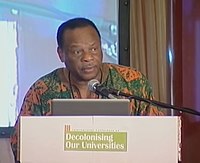
Afrocentricity is an academic theory and approach to scholarship that seeks to center the experiences and peoples of Africa and the African diaspora within their own historical, cultural, and sociological contexts.[1][2][3][4] First developed as a systematized methodology by Molefi Kete Asante in 1980, he drew inspiration from a number of African and African diaspora intellectuals including Cheikh Anta Diop, George James, Harold Cruse, Ida B. Wells, Langston Hughes, Malcolm X, Marcus Garvey, and W. E. B. Du Bois.[1] The Temple Circle,[5][6] also known as the Temple School of Thought,[6] Temple Circle of Afrocentricity,[7] or Temple School of Afrocentricity,[8] was an early group of Africologists during the late 1980s and early 1990s that helped to further develop Afrocentricity, which is based on concepts of agency, centeredness, location, and orientation.[5]
- ^ a b Monteiro-Ferreira, Ana (2009). "Afrocentricity and the Western Paradigm". Journal of Black Studies. 40 (2): 333–335. doi:10.1177/0021934708314801. ISSN 0021-9347. JSTOR 40282637. OCLC 461451432. S2CID 144475771.
- ^ Asante, Molefi Kete (Dec 17, 2007). An Afrocentric Manifesto: Toward an African Renaissance. Polity. p. 17. ISBN 9780745641027. OCLC 156812629. S2CID 190415914.
- ^ Alkebulan, Adisa A. (Jan 2007). "Defending The Paradigm". Journal of Black Studies. 37 (3). Sage Publications, Inc: 411, 413–417. doi:10.1177/0021934706290082. ISSN 0021-9347. JSTOR 40034783. OCLC 7104045481. S2CID 143557323.
- ^ Pellerin, Marquita (June 2012). "Benefits of Afrocentricity in Exploring Social Phenomena: Understanding Afrocentricity as a Social Science Methodology" (PDF). The Journal of Pan African Studies. 5 (4): 149–160. ISSN 0888-6601. OCLC 6864551898. S2CID 18435352.
- ^ a b Asante, Molefi Kete; Mazama, Ama; Cérol, Marie-José (2005). "Temple Circle". Encyclopedia of Black Studies. SAGE. p. 445. doi:10.4135/9781412952538. ISBN 9781452265445. OCLC 61296166. S2CID 141533226.
- ^ a b Karenga, Maulana (2018). "Founding the First PhD in Black Studies: A Sankofa Remembrance and Critical Assessment of Its Significance". Journal of Black Studies. 49 (6). SAGE Journals: 587. doi:10.1177/0021934718797317. ISSN 0021-9347. JSTOR 26574582. OCLC 7840305163. S2CID 150088166.
- ^ Asante, Molefi Kete (Oct 19, 2010). "Afrocentricity and Africology: Theory and Practice in the Discipline". African American Studies. Edinburgh University Press. p. 48-50. ISBN 9780748686971. JSTOR 10.3366/j.ctt1g0b6m8. OCLC 703158344.
- ^ Myers, Joshua (2015). "Racial Economies of Academia: Africana Studies as Arbiter". Journal of African American Studies. 19 (1): 85. doi:10.1007/s12111-014-9291-8. ISSN 1559-1646. JSTOR 43525579. OCLC 5739148920. S2CID 144208208.
